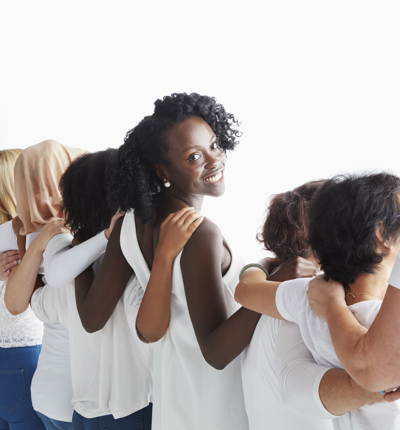
Campaigning for women's rights in healthcare
Periods and menopause are not a women's issue - they are an issue for everybody. Diane Danzebrink
Posted on 07 October 2020
Amika spoke about what inspired her to start the Free Periods campaign when she was a teenager, and the challenges she faced in persuading the UK government to take notice. She said:
I was a sixth form student in North London, when I read an article on my phone one morning that reported many girls were missing school – sometimes up to a whole week every month – because they could not afford period products. This really shocked me, that in 21st century Britain we could have girls missing school because they don’t have enough money for a pad or tampon.”
Amika described how her campaign grew from outrage at the breakfast table into something much bigger.
“I started a social media campaign, a petition on change.org, and organised a protest outside Downing Street. The response I received from hundreds of young girls and women was incredible - they were so passionate about this issue. With the support of several celebrities, and a few MPs, we were trending on Twitter and had coverage on every TV news channel,” she said.
Word of Amika’s campaign spread fast and several other countries began tackling the issue. In contrast, the frustratingly slow response from her own government prompted the Free Periods campaign to become a limited company and launch a legal challenge in 2019.
Amika said:
“That was a transformative moment for me; people woke up to the fact that I couldn’t just be written off as an angry schoolgirl – they realised I have the law on my side and they have to take me seriously.”
Two and a half years after starting the campaign, the government did agree to launch a scheme to fund period products in school from January 2020.
As well as working to ensure schools take up the scheme, Amika remains passionate about educating students and ridding periods of their taboo status:
“The word ‘period’ still scares people. So many girls are taught to hide tampons up their sleeve on their way to the toilet, and this teaches them it is something to be ashamed about. There is a huge need for good education and more openness around periods in schools – I’m determined to change the conversation.”
Suzanne White drew parallels with Diane Danzebrink’s menopause work. Both periods and menopause continue to be taboo subjects that are rarely spoken about and, as a result, women feel embarrassed and often suffer in silence because of this.
Diane explained more about her campaign to change the menopause status quo. She said:
“My work stems from my own personal experience when I had to have my ovaries, womb and cervix removed suddenly, at 44 years, because of cancer.
“I was not given adequate time to prepare, or any information about the menopause I would have to go through. I declined the initial offer of HRT from my GP – as all I had heard was scare stories in the media – and my doctor didn’t explain why replacing lost hormones was so important.
“Within a few months, I was very anxious, I had given up work, didn’t want to socialise or even walk my beloved dogs. I thought I was going mad and was just a non-functioning husk of my former self.
“One day, after a moment of suicidal thought, my terrified husband took me back to the GP to see someone who was, fortunately, much more helpful at explaining why I was feeling the way I was, and how crucial it was that I replace my absent oestrogen by taking HRT. I thought ‘if I ever feel better, I am going to do all I can to make sure no other woman has to go through this experience’.”
After having to see a menopause specialist, privately, to get on to the right type and amount of HRT, and time to adjust and recover further, Diane began to feel well enough to fulfil her promise to help other women.
She explained:
“I started the menopause support website and Facebook group from my kitchen table. Hearing from thousands of women, it was very clear that my experience was not unusual at all, and there was indeed a huge void of knowledge within healthcare professionals about the impact of menopause, the variety of how symptoms can present, and the importance of getting the right help, including HRT.”
In 2018, the #makemenopausematter campaign was launched; it had three main objectives:
-
To improve training to healthcare professionals, particularly GPs
-
To see greater support for menopause in the workplace
-
To introduce menopause into the Relationships and Sex Education curriculum in secondary schools
Diane said:
“In less than a year after launch, with the help from some very supportive MPs, we were successful in getting the curriculum addition we had fought for.
“Now, as a not-for-profit company, we are seeking funds to be able to provide schools, workplaces and GP practices with clear, evidence-based menopause information packs - tailored to each setting - to help meet our other two aims. There is no point in flagging up problems unless you’re willing to help with the solutions.”
Speaking on behalf of Amika’s campaign as well, Diane concluded the webinar with the following:
“Periods and menopause are not a women’s issue – they are an issue for everybody. Doing something about this is not just a win-win for now, it’s a win-win for the future.”


